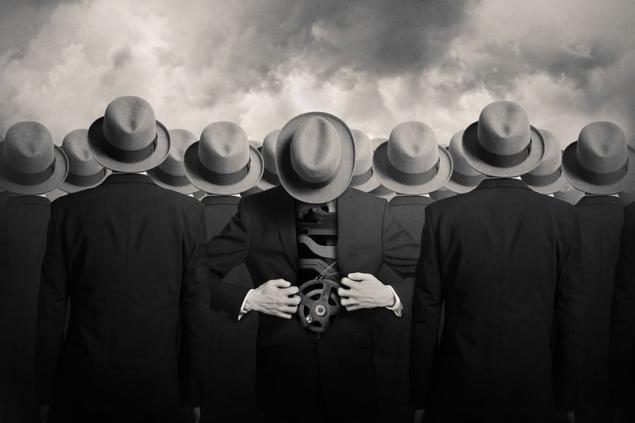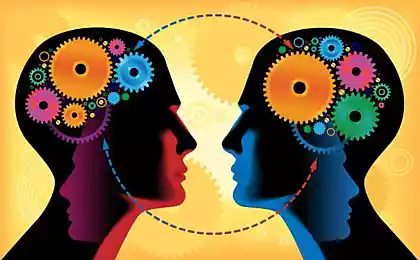512
The bias value judgments and social comparison
Myths about motivation, confirmation bias, social comparison and a passion for reality shows
Prejudice is part of human nature. We rely on our preconceptions on many issues — for example, when personal experience works for us and helps to make the right decision or make the right choice. However, bias can also lead to incorrect estimation of erroneous judgments and undesirable results. Biased self-assessment, which is sometimes called the "confirmation bias" ("myside bias", "confirmation bias", Stanovich, 2009), is the tendency to believe that your way of thinking and reasoning is superior to the methods used by someone else in an identical or very similar situation.

According to Bobby Hoffman, Ph.D. in the field of educational psychology and expert in the field of motivation, the best example of confirmation bias is "the dilemma of the highway". Everyone on the road think that the driver who is going faster than him, more reckless and irresponsible, and anyone who drives slower, does not have enough driving skills or common sense.
Such a biased point of view often leads to an erroneous conclusion that your driving behaviour is absolutely justified and correct, while all others behave correctly. But isn't it better in this situation to keep in mind that other drivers think about your speed?
Biased thinking and errors in judgment manifest themselves in many situations. In one of his articles Hoffman walked down main preconceptions about the motivation and relationships. Here are some of these errors.
There is no such thing as a lack of motivation
Have you ever said "nezametdinova he" or "she's not displaying initiative" when describing the spouse, partner, child, student or colleague? Most likely, if not even utter such words, you will of course heard.
"Think about your spouse, sibling, friend or child who stay in their pajamas when you are going for work at 7:00 am. We may seem that we are dealing with people without motivation, but in fact, this may indicate that people use a different set of standards and beliefs that differ from our own.We have a value judgment because if we think that people are less motivated than us, we feel a sense of psychological superiority or power."
When interacting with teachers and business leaders, I often met with the opinion that the academic apathy or lack of involvement in the workflow indicates the lack of motivation.
"Such statements show that we are constantly engaged in the generation of the estimates themselves and others. The problems begin when we find discrepancies between how we see ourselves compared to the person we want to be, our perception of reality and how we relate to other people."
In this case, the bias is the belief that the apparent lack of a specific behavior indicates the lack of motivation in General. However, there is strong evidence that the academic and personal motivation (e.g., self-control) is a renewable resource that is restored, like muscles after a workout; and the statement "lack of motivation" is a convenient formulation that people use to describe someone who thinks and acts differently from himself.
People are just motivated by different things, and motivation is changing all the time.
Social comparison can reduce performance for no
We also should stop to evaluate personal success by comparing themselves with other people to which we feel either admiration or hostility. This type of social comparison makes us susceptible to confirmation bias, which happens when we are looking for and remember evidence confirming our beliefs, unconsciously filtering out information inconsistent with our beliefs, values and customs.
In this case, the offset is because the comparison ignores objective performance standards and shifts our attention to modeling the behavior characteristic of another person, or intentional desire to differ from the other person.
Social comparison involves a choice: either to beat the performance of the opponent, or protect yourself from the worst results and the humiliation by avoiding unsuccessful or imperfect results achieved to others. If we need an example of "downward" social comparison, which serves as a confirmation of confirmation bias, that can quite approach the presidential elections in the United States. Regardless of who you support, candidates are regularly looking for ways to discredit, belittle and demean your opponent.At the same time, each candidate ignores the achievements of opponents, rarely focusing on what the necessary skills to effectively accomplish the work of the President of the United States.
There are some psychological benefits derived from of confirmation bias and the comparison of man with man. In some cases, when we compare ourselves to others, we develop the concept of positive self-image and strengthening our ego that protects us from insecurity in themselves, in their capabilities and performance. But the personal rating (when you compare your present with a past) can also improve emotional state, to lift spirits and strengthen our sense of self-esteem. Despite the obvious benefits, comparing yourself with another person actually turns out to be a less effective tool for motivation and performance than comparing yourself to the absolute standard (Pintrich, 1999). When the comparison leads to a negative self-image, there is a number of problems: people are less willing to take risks, worse cope with a bad mood and less feel a sense of General well-being (Aspinwall & Taylor, 1993).
Influence on teenagers
Social comparison is especially strong effects on adolescents. Often problems develop when the comparison does not meet expectations, especially in non-academic subjects, such as music or physical education.
In most cases for adolescents is of great importance, whom to choose as a representative of the school group, appoint the football team or the team of cheerleaders as it relates to social status. Usually, specific skills are secondary to equality and inclusion in the group, as the persons chosen for important roles, are considered a priori more competent in comparison with others, even despite the potential lack of certain skills or abilities. I know that when I chose to be a brother of Helen Keller, James, in the school play "miracle worker", it was not because of my stellar abilities of the tragedian, but probably because nobody else auditioned and I agreed to appear at rehearsals every day.
A comparative evaluation contrasts sharply with "real world" where there are a lot of employment options and selection on the basis of competence and ability to meet and exceed specific performance standards.
Oddly enough, preconceived notions can affect how we evaluate people in many conventional cases, professional and personal situations, life-changing. Interpersonal comparisons determine whether we enter College (based on the assessment of SAT ⓘScholastic Assessment Test — standardized test, the results of which need applicants for admission to elite colleges) that influence the choice of our social and romantic partners, and social comparison often determines who gets jobs and who doesn't. The driving force of social comparison is so large that it gave rise to the effect called in the parlance of "big fish, small pond" (Marsh, 1987), according to which people prefer to be the expert among the less qualified professionals.
To be a big shark in aquarium with small fish does not guarantee success and in fact can give a person a false sense of competence in the actual lack of skill and abilities. However, in the "big fish" may be psychological benefits. Numerous studies in different cultures and age groups shows that when people of the same abilities realize that they are in the "group of low ability", they have more positive self-esteem, have higher academic self-esteem and achieve higher grades in contrast to situations where the same individuals are immersed in a more complex and competitive learning environment requiring high skills.
Why we like reality shows?
While social comparison has potentially negative consequences and can distort our self-perception and evaluation of others, there is another phenomenon, which has large consequences for all of society is prevailing in the XXI century medialine known as a reality show. Although some studies show that the popularity of the reality show tied to a sense of involvement or personal pleasure derived from watching heroes (Barton, 2013), the motives of social comparison may be a more plausible explanation for the huge popularity of this phenomenon.
What happens when we watch reality TV?
The audience is struggling to positive self-esteem, enjoying the disappointment, failure and bad behaviour of pseudo-celebrities and those images of cranky, selfish, social misfits, which are broadcast on the screen.
Indeed, the results of studies investigating the motivation of the audience when watching reality shows, shows that people watch these shows to escape their normal life and get pleasure from observing other people, publicly making fools of themselves (Lundy, Ruth, & Park, 2008). Positive psychological benefits occur when the social comparison of the audience and "celebrity", despite the fact that we are doing comparative and biased judgments about people we hardly know but are willing to arbitrarily assess and strongly criticize.
The strategy of elimination of bias
It is clear that my comments are also biased and potentially in conflict with your own beliefs and personal ideology. However, studies show that the adaptive motivation starts with appropriate reasoning and eliminate personal bias. A necessary first step towards objectivity is to assess the credibility of arguments based on the merits of objective evidence, not on comparison with other historically similar situations, personal experience, heard somewhere that the findings or what we would like to believe about ourselves. published
P. S. And remember, just changing your mind — together we change the world! ©
Source: monocler.ru/predvzyatost-podtverzhdeniya-i-oshibki-suzhdeniya/
Prejudice is part of human nature. We rely on our preconceptions on many issues — for example, when personal experience works for us and helps to make the right decision or make the right choice. However, bias can also lead to incorrect estimation of erroneous judgments and undesirable results. Biased self-assessment, which is sometimes called the "confirmation bias" ("myside bias", "confirmation bias", Stanovich, 2009), is the tendency to believe that your way of thinking and reasoning is superior to the methods used by someone else in an identical or very similar situation.

According to Bobby Hoffman, Ph.D. in the field of educational psychology and expert in the field of motivation, the best example of confirmation bias is "the dilemma of the highway". Everyone on the road think that the driver who is going faster than him, more reckless and irresponsible, and anyone who drives slower, does not have enough driving skills or common sense.
Such a biased point of view often leads to an erroneous conclusion that your driving behaviour is absolutely justified and correct, while all others behave correctly. But isn't it better in this situation to keep in mind that other drivers think about your speed?
Biased thinking and errors in judgment manifest themselves in many situations. In one of his articles Hoffman walked down main preconceptions about the motivation and relationships. Here are some of these errors.
There is no such thing as a lack of motivation
Have you ever said "nezametdinova he" or "she's not displaying initiative" when describing the spouse, partner, child, student or colleague? Most likely, if not even utter such words, you will of course heard.
"Think about your spouse, sibling, friend or child who stay in their pajamas when you are going for work at 7:00 am. We may seem that we are dealing with people without motivation, but in fact, this may indicate that people use a different set of standards and beliefs that differ from our own.We have a value judgment because if we think that people are less motivated than us, we feel a sense of psychological superiority or power."
When interacting with teachers and business leaders, I often met with the opinion that the academic apathy or lack of involvement in the workflow indicates the lack of motivation.
"Such statements show that we are constantly engaged in the generation of the estimates themselves and others. The problems begin when we find discrepancies between how we see ourselves compared to the person we want to be, our perception of reality and how we relate to other people."
In this case, the bias is the belief that the apparent lack of a specific behavior indicates the lack of motivation in General. However, there is strong evidence that the academic and personal motivation (e.g., self-control) is a renewable resource that is restored, like muscles after a workout; and the statement "lack of motivation" is a convenient formulation that people use to describe someone who thinks and acts differently from himself.
People are just motivated by different things, and motivation is changing all the time.
Social comparison can reduce performance for no
We also should stop to evaluate personal success by comparing themselves with other people to which we feel either admiration or hostility. This type of social comparison makes us susceptible to confirmation bias, which happens when we are looking for and remember evidence confirming our beliefs, unconsciously filtering out information inconsistent with our beliefs, values and customs.
In this case, the offset is because the comparison ignores objective performance standards and shifts our attention to modeling the behavior characteristic of another person, or intentional desire to differ from the other person.
Social comparison involves a choice: either to beat the performance of the opponent, or protect yourself from the worst results and the humiliation by avoiding unsuccessful or imperfect results achieved to others. If we need an example of "downward" social comparison, which serves as a confirmation of confirmation bias, that can quite approach the presidential elections in the United States. Regardless of who you support, candidates are regularly looking for ways to discredit, belittle and demean your opponent.At the same time, each candidate ignores the achievements of opponents, rarely focusing on what the necessary skills to effectively accomplish the work of the President of the United States.
There are some psychological benefits derived from of confirmation bias and the comparison of man with man. In some cases, when we compare ourselves to others, we develop the concept of positive self-image and strengthening our ego that protects us from insecurity in themselves, in their capabilities and performance. But the personal rating (when you compare your present with a past) can also improve emotional state, to lift spirits and strengthen our sense of self-esteem. Despite the obvious benefits, comparing yourself with another person actually turns out to be a less effective tool for motivation and performance than comparing yourself to the absolute standard (Pintrich, 1999). When the comparison leads to a negative self-image, there is a number of problems: people are less willing to take risks, worse cope with a bad mood and less feel a sense of General well-being (Aspinwall & Taylor, 1993).
Influence on teenagers
Social comparison is especially strong effects on adolescents. Often problems develop when the comparison does not meet expectations, especially in non-academic subjects, such as music or physical education.
In most cases for adolescents is of great importance, whom to choose as a representative of the school group, appoint the football team or the team of cheerleaders as it relates to social status. Usually, specific skills are secondary to equality and inclusion in the group, as the persons chosen for important roles, are considered a priori more competent in comparison with others, even despite the potential lack of certain skills or abilities. I know that when I chose to be a brother of Helen Keller, James, in the school play "miracle worker", it was not because of my stellar abilities of the tragedian, but probably because nobody else auditioned and I agreed to appear at rehearsals every day.
A comparative evaluation contrasts sharply with "real world" where there are a lot of employment options and selection on the basis of competence and ability to meet and exceed specific performance standards.
Oddly enough, preconceived notions can affect how we evaluate people in many conventional cases, professional and personal situations, life-changing. Interpersonal comparisons determine whether we enter College (based on the assessment of SAT ⓘScholastic Assessment Test — standardized test, the results of which need applicants for admission to elite colleges) that influence the choice of our social and romantic partners, and social comparison often determines who gets jobs and who doesn't. The driving force of social comparison is so large that it gave rise to the effect called in the parlance of "big fish, small pond" (Marsh, 1987), according to which people prefer to be the expert among the less qualified professionals.
To be a big shark in aquarium with small fish does not guarantee success and in fact can give a person a false sense of competence in the actual lack of skill and abilities. However, in the "big fish" may be psychological benefits. Numerous studies in different cultures and age groups shows that when people of the same abilities realize that they are in the "group of low ability", they have more positive self-esteem, have higher academic self-esteem and achieve higher grades in contrast to situations where the same individuals are immersed in a more complex and competitive learning environment requiring high skills.
Why we like reality shows?
While social comparison has potentially negative consequences and can distort our self-perception and evaluation of others, there is another phenomenon, which has large consequences for all of society is prevailing in the XXI century medialine known as a reality show. Although some studies show that the popularity of the reality show tied to a sense of involvement or personal pleasure derived from watching heroes (Barton, 2013), the motives of social comparison may be a more plausible explanation for the huge popularity of this phenomenon.
What happens when we watch reality TV?
The audience is struggling to positive self-esteem, enjoying the disappointment, failure and bad behaviour of pseudo-celebrities and those images of cranky, selfish, social misfits, which are broadcast on the screen.
Indeed, the results of studies investigating the motivation of the audience when watching reality shows, shows that people watch these shows to escape their normal life and get pleasure from observing other people, publicly making fools of themselves (Lundy, Ruth, & Park, 2008). Positive psychological benefits occur when the social comparison of the audience and "celebrity", despite the fact that we are doing comparative and biased judgments about people we hardly know but are willing to arbitrarily assess and strongly criticize.
The strategy of elimination of bias
It is clear that my comments are also biased and potentially in conflict with your own beliefs and personal ideology. However, studies show that the adaptive motivation starts with appropriate reasoning and eliminate personal bias. A necessary first step towards objectivity is to assess the credibility of arguments based on the merits of objective evidence, not on comparison with other historically similar situations, personal experience, heard somewhere that the findings or what we would like to believe about ourselves. published
P. S. And remember, just changing your mind — together we change the world! ©
Source: monocler.ru/predvzyatost-podtverzhdeniya-i-oshibki-suzhdeniya/























